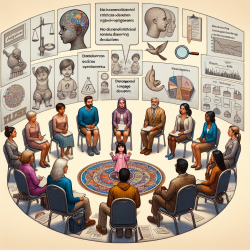In the field of speech-language pathology, understanding the lived experiences of individuals with developmental language disorder (DLD) can provide invaluable insights for practitioners. The recent research article titled A First-Person Account of Developmental Language Disorder by Orrego et al. (2023) offers a unique perspective that can enhance clinical practice. This blog post will discuss key takeaways from the research and how practitioners can apply these findings to improve their skills and outcomes for children with DLD.
Key Takeaways from the Research
The study presents an autobiographical account of an adult with DLD, detailing her journey from early signs and diagnosis to treatment and long-term impacts. Here are some critical insights:
- Early Identification: The importance of comparing developmental milestones with age-based norms is crucial. Practitioners should be vigilant in recognizing early signs of DLD, such as late onset of word combinations and limitations in sentence complexity.
- Parental Involvement: The role of caregivers is indispensable. Practitioners should encourage parents to observe and report their child's language development, as their insights can significantly improve screening accuracy.
- School-Based Evaluations: Schools often serve as the primary setting for identifying potential language problems. Practitioners should collaborate with educational staff to ensure comprehensive evaluations.
Implementing the Research Findings
To enhance clinical practice, practitioners can implement the following strategies based on the research findings:
- Continuous Monitoring: DLD is a lifelong condition that changes with development. Regular assessments can help identify emerging challenges and adjust treatment plans accordingly.
- Holistic Approach: DLD affects various aspects of life, including social, emotional, and academic domains. A comprehensive treatment plan should address these areas to improve overall quality of life.
- Therapeutic Alliance: Building a strong, trusting relationship with the child and their family can enhance treatment efficacy. Practitioners should create a safe and supportive environment for the child to take risks and learn.
Encouraging Further Research
While the first-person account provides valuable insights, further research is essential for a more comprehensive understanding of DLD. Practitioners are encouraged to contribute to and stay updated with ongoing research to continually refine their approaches and interventions.
To read the original research paper, please follow this link: A First-Person Account of Developmental Language Disorder.










